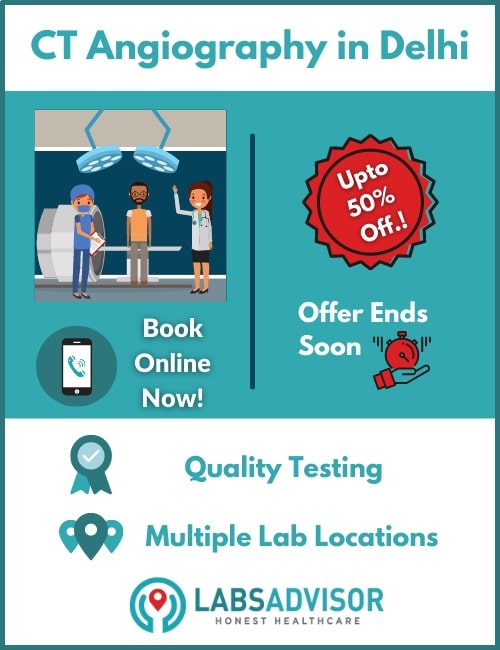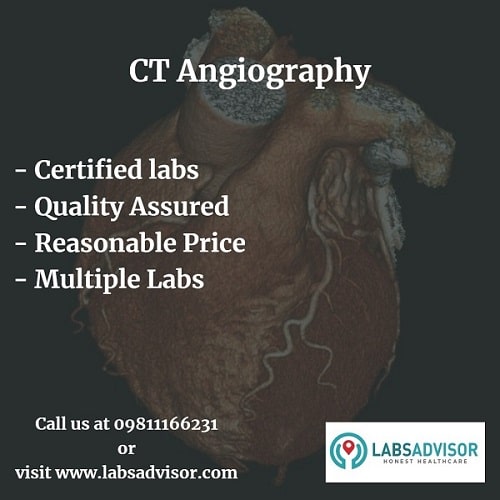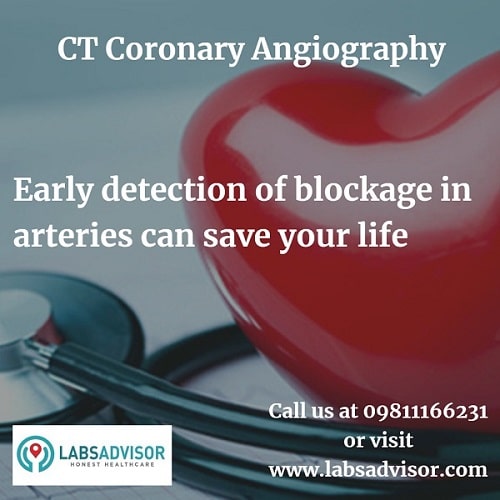
CT Angiography / CT Angiogram is a diagnostic procedure that uses x rays to provide images of the heart and the blood vessels going to the heart. It can also provide detailed images of blood vessels going to the lungs, kidneys, brain, neck, and other limbs.
Book this really important test at high-quality labs like Mahajan Imaging, City X-Ray, and at your local top quality labs through us at up to 50% discount. The lowest CT Angiography cost in Delhi is ₹5250 only.
CT Angiography in Delhi NCR Through LabsAdvisor
|
CT Angiography Price in Delhi and Lab Details
Below is the list of top CT Angiography test cost in Delhi, please click on the link of the CT Angiography you want and you can see all the labs near you and book online.
You can also select the time slot suitable for you for your CT Angiography. Click on the links below to book anytime, 24 hours a day.
| CT Angiography Labs & Book Appointment | Price Starting From |
| CT Coronary Angiography Cost in Delhi | ₹9300 |
| CT Pulmonary Angiography Cost in Delhi | ₹5250 |
| CT Upper Limb Angiography Cost in Delhi | ₹5600 |
| CT Abdomen Angiography Cost in Delhi | ₹5450 |
| CT Abdomen Angiography Dual-Phase Cost in Delhi | ₹8400 |
| CT Brain Angiography Cost in Delhi | ₹6300 |
| CT Aortic Angiography Cost in Delhi | ₹7875 |
| CT Carotid Angiography Cost in Delhi | ₹6650 |
| CT Renal Angiography Cost in Delhi | ₹5250 |
If your CT Angiography is not listed in the table above, call us on +918061970525. We will get back to you with the CT Angiography near your location in Delhi.
Get the lowest CT Angiography test price in Delhi by calling us at
If you want us to call you back, click on the link below

Frequently Asked Questions About CT Angiography Scan
What is CT Angiography?
CT Angiography / CT Angiogram is a diagnostic procedure that uses x rays to provide images of the heart and the blood vessels going to the heart. It can also provide detailed images of blood vessels going to the lungs, kidneys, brain, neck, and other limbs.
The procedure involves the use of a contrast agent which is injected into the body. In some cases, the contrast agent may not be required based on your context. You have to then lie on a table that moves inside a cylindrical-shaped CT Scan machine. The CT Scan machine can interact with the injected contrast agent and produce images of blood vessels. These images help your doctor in understanding the level of blockage, also called the plaque, in your arteries or veins.
What is CT Coronary Angiography?
CT Coronary Angiography also referred to as CT Cardiac Angiography or CT Angiography Heart, is a type of CT Angiogram that focusses on the heart and the vessels going into the heart. This is used to understand the blockages around the heart. The procedure is only minimally invasive and can produce images of the arteries in seconds. Generally, CT Coronary Angiography is useful in the following cases:
- Patients who have chest pain
- Suspected coronary artery disease
- Suspected blockage of arteries
- An aneurysm
- Follow check-up after heart surgery
- Preventive check for people who may have the propensity for heart diseases
How is CT Coronary Angiography different from traditional Angiography?
Traditionally, if the doctor wanted to see the blockage in the arteries, they would perform an invasive procedure called angiography. In angiography, a wire or catheter is inserted in the body and the level of blockages was known through the external x rays that interacted with the material in this wire. This procedure generally involved getting admitted in a hospital and given its complicated and invasive nature, was not performed as a preventive check.
CT Coronary Angiography has become a better alternative to traditional angiography. By using a 64 slice or above CT Scan machine, blood vessel blockage can be checked within minutes.
This procedure is not invasive or painful in any way. It is quick and does not require any hospitalization. Given its ease, this procedure can even be used as a preventive check for people who are prone to heart diseases like smokers or people with a family history of heart diseases.
Given that blockage in the arteries does have too many outward symptoms, CT Coronary Angiography is changing the way diagnosis of heart diseases is done.
While this CT Angiogram is being used extensively for heart disease diagnosis, there are other uses too. CT angiogram can be done for the brain, carotid, lungs, kidney, and limbs.
Below is a speech by a famous cardiologist about the advantages of CT Coronary Angiography vs. traditional angiography. It also covers how CT Coronary Angiography can be used as a preventive check for those with a family history of coronary heart conditions. It is an audio file without any video.
Who should get CT Coronary Angiography done?
Indians are highly prone to heart diseases. Heart attacks are one of the biggest killers in urban India. The heart gets its nutrients from blood vessels called coronary arteries. Reduction in supply to heart muscles may lead to a heart attack.
The most common reason for a heart attack is the block of coronary arteries. This blockage is caused by fat deposition. The first symptoms of a heart attack come when coronary arteries are over 70% blocked. Early detection of this blockage can save lives by avoiding heart attacks.
CT Coronary Angiography is a great test to check your blood vessel blockage and catch it before it is too late. Its advantages of speed, accuracy, almost no discomfort and much more economical than traditional angiography, are responsible for its increasing use in testing of heart attack-prone individuals.
People above the age of 35 with the following risk factors should consider CT Coronary Angiography
- High blood pressure of over 130 / 90 mm
- Family history of heart disease
- Smoking
- Obesity
- The feeling of chest pain or breathlessness
- Sedentary lifestyle
- High Cholesterol
- Diabetes
CT Angiography scan takes less than 5 seconds. Preparation for the scan can take anywhere between 30 minutes to 1 hour.
What is the procedure for CT Coronary Angiography?
As mentioned earlier, CT Angiography is a non-invasive and painless procedure. You lie down on a flatbed and the contrast agent will be inserted through one of the veins. If your chest is hairy, it will need to be shaved. This is required because ECG leads are attached to your chest before a CT scan is done. The scan is done by the CT machine along with ECG gating.
If you are taking any medications, let your doctor know. Since CT Angiography requires the use of contrast material, your doctor may recommend anti-allergy medicines if she suspects that you may get an allergic reaction. Pregnant women are generally not allowed to get a CT Scan done as there is a possibility of harm to the fetus. Breastfeeding mothers should also discuss the procedure beforehand. There may be precautions required for breastfeeding mothers.
Additionally, let your doctor know about any other medical conditions including diabetes and thyroid disorders. If you have had any other test done like x-ray or ct scan in the last few days, the doctor should know about those also.
On the day of the test, you should dress comfortably. Leave all the jewelry at home. You may be required to have fasting of 6 to 8 hours before the test. It is always a good idea to speak with the lab beforehand to know of any additional requirements for the test.
No post-scan care is recommended. You can resume your normal activities immediately after your CT Angiography scan.

Interesting topics you may look for by LabsAdvisor:






